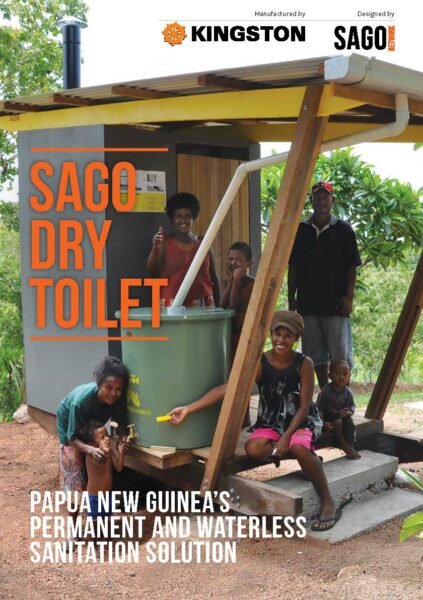NEWS: SAGO TOILET UPDATE
Long term Healthabitat collaborators, Sago Network, continue to focus on PNG’s waterless and Permanent Sanitation Solution

Front cover of the Sago Dry Toilet Brochure
Sago Network continues to focus on improving village health throughout Papua New Guinea (PNG) via a range of water and sanitation initiatives and programmes. As we have written about before, the Sago Dry Toilet is one of their main focus areas as it provides communities in PNG:
- With a waterless and permanent sanitation option, where the high water table and lack of good quality sanitation is a concern
- Continues to supports local jobs through local manufacturing
- Supports fruit tree and crop growth through use of dehydrated solids as a fertiliser
See a brochure on the toilet system with fantastic infographics communicating the design and educating about how the toilet works, how to use it and how to maintain the system.
Certifying the Toilet
IAPMO have been asked about certifying the composting unit, which would involve a period of testing over 12-18 months. The ongoing tests over this period of time would regularly test the water/urine and compost/faeces components to test the amount of harmful bacteria breakdown.
A possible path to certifying the toilet system could be by achieving a ‘Oceanamark certification’ over the product like any standard toilet or tap hardware. This means the toilet would officially comply with the Australian Standard for ‘On-site domestic wastewater treatment units’ AS/NZS 1546.2: 2008. This formal label means the toilet system could be used across other countries and nations.
IWSH (the charitable arm of IAPMO), are confident in the composting system as it has been proven to work in the tough climate of PNG with its high use, high humidity and temperatures. It is clear if it can work in the PNG climate, this could be a real option for other climates such as the dry desert climate of the Northern Territory.
Healthabitat would like to congratulate Sago on their continued and dedicated work in developing the system to improve the health of PNG communities. Though the certification path is not confirmed, we are looking forward to following the certification process.









